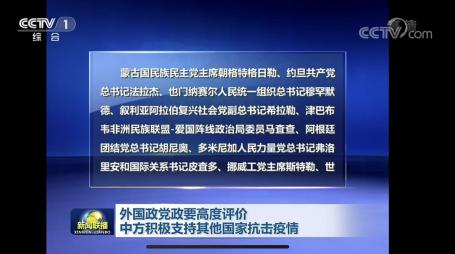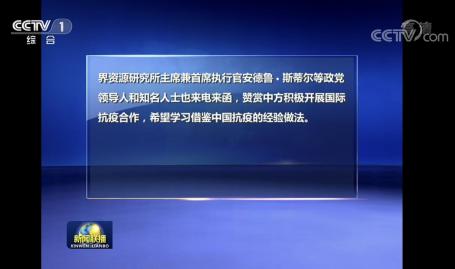STATEMENT: WRI Statement in Response to COVID-19
The Chinese central government expressed gratitude to Andrew Steer on WRI’s encouragement to China against the virus outbreak through the prime time CCTV-1 News (the top 1 news program in China) on Mar.20,2020


Following is a statement by Dr. Andrew Steer, CEO and President of World Resources Institute, on the COVID-19 pandemic on Mar.18, 2020
"The global pandemic of infection and fear we now face is inflicting sickness, death and economic hardship around the world – and will surely get worse before it gets better. It is also reminding us all how deeply vulnerable we are to threats beyond our control. It is possible that it could lead to a questioning of old assumptions and behaviors, and a new openness to arguments for collective action and effective risk management.
"This view informs WRI’s three-fold response to the pandemic. We are protecting our staff and their families across our global network. We are strengthening how we operate in the virtual realm, internally and with our partners, to enable us to deliver on our goals in this very important year. And we are reassessing our activities so that we can help ensure that the world’s response to the COVID-19 crisis and the other risks leads to a safer and more resilient future.
"Our first priority: the safety of our staff. Our efforts to protect our staff and their families from the virus began in January, when WRI China shifted to mandatory work from home. As the virus spread internationally, we have taken similar steps across our network so that all our offices are now on mandatory work from home. With the improvement of the situation in China, our Beijing team is assessing when to return to their offices. All WRI-sponsored events are being shifted online or postponed.
"New ways of operating: WRI’s staff live and work across 19 times zones – which has given us plenty of practice using technology to bridge time and distance. Like others, we are learning fast how to use new technologies more effectively to engage our partners to ensure that our work has maximum impact. In the weeks ahead, we will apply our skills, working with our partners, to find new ways to bring people together and forge powerful coalitions for change in this most important of years.
"Building more resilient economies and societies: Crises can bring people together or push them apart. They can lead to cynicism and a loss of faith in institutions, or to a deeper understanding of risk and determination to “build back better.” For example, hundreds of billions of dollars will be spent in the coming months to reflate declining economies. These investments could simply restore the high carbon and unequal economies of today. Or they could help drive low carbon development and protect against the threats that already exist.
"More broadly, the crisis must result in risks being much better assessed, and these assessments in turn driving policy and budget allocations. WRI will be launching new work in these areas, and doing our best to make sure that the lessons of this crisis are not lost. As an example, we are drawing on our knowledge of past stimulus packages to identify measures that would boost poverty-reducing growth and advance climate protection. Faced with a global health crisis and a global climate crisis, the world cannot afford to pick one: leaders must find a way to address both emergencies simultaneously. We at WRI commit to working with our partners to discover how.
"Our commitment: 2020 was to have been a year of crucial international decisions on climate, biodiversity and the ocean. The massive human and economic disruption caused by the COVID-19 pandemic – with its closed offices, distracted politicians, economic downturn and overall sadness – could make progress in these areas much more difficult. But at a deeper level, it is possible that it may open the door for more systemic change. Our hope is that with the right leadership this crisis could spur citizens, politicians and corporate leaders to embrace a new way of doing business – a new social contract founded on a commitment to increased support for the vulnerable, protection of natural systems on which we all depend, and more effective collective action to address common threats. We will work towards this end."